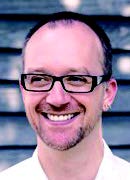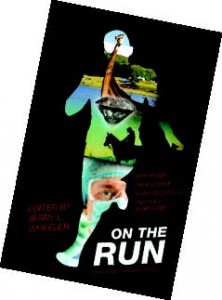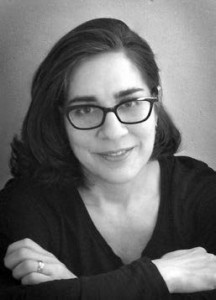 Michele Karlsberg: Are there underrepresented groups or ideas featured in your book/books? If so, discuss them.
Michele Karlsberg: Are there underrepresented groups or ideas featured in your book/books? If so, discuss them.
Nathan Burgoine: One of the things about being queer that’s a challenge is that we’re (usually) not born to queer families. There’s no “passing on” of the culture from parent to child in most instances, and certainly mainstream education skips us on by. We have to go find ourselves and our representation.
I’ve always tried to write books I wanted to read when I was younger—speculative fiction, mostly. Our world, but with a dash of the psychic or the magic or just something “other” thrown in that steps off from lived reality. But what I never found was a character like me—a queer kid, when I was younger, or even much in the way of queer adults, period. That’s changing, of course, and with speculative fiction crossing so many boundaries, now I’m pleased to say I’m one of many adding queer voices to the genre.
 Now that I’m feeling a bit more settled in the craft, I’m also trying to include more intersectionality to my queer characters—it’s woeful how very white, cisgendered, and neurotypical the characters of queer fiction are, in general. In my novella in On the Run, I tried hard to translate what it’s like to have seizures with the main character. His best friend, a half-Japanese, half-Caucasian lesbian, is by far more his family than his biological one. The idea of a “chosen” family is one I try to visit often in my work, and I think that’s a major piece of being queer.
Now that I’m feeling a bit more settled in the craft, I’m also trying to include more intersectionality to my queer characters—it’s woeful how very white, cisgendered, and neurotypical the characters of queer fiction are, in general. In my novella in On the Run, I tried hard to translate what it’s like to have seizures with the main character. His best friend, a half-Japanese, half-Caucasian lesbian, is by far more his family than his biological one. The idea of a “chosen” family is one I try to visit often in my work, and I think that’s a major piece of being queer.
Nathan Burgoine’s debut novel “Light” was a finalist for the SF/F/Horror Lambda Literary Award. He lives in Ottawa, Canada, with his husband Daniel and their rescued husky Coach.
MB Cashetta: I grew up in an Italian-American home in Upstate New York, which means I grew up uncomfortably queer in a Catholic environment. And yet I always thought that the pure message I heard in church (where I spent a lot of time) was inclusive of everyone—even little lesbian me. Only did the human additions—editorializing, dogma, and interpretation—actually count me out. But I just kept right on stubbornly believing that God had it right in loving me for being me, and people had it wrong in hating me for being queer.
Miracle Girls: A Novel attempts to create a world in which there is a driving spiritual force toward convincing little girls they are prized and convincing queer kids that they are God’s chosen ones. (Imagine a world in which everyone believes this is true!)
Writing a book about queerness and faith can be tricky. It has to balance grim reality with hope and light. The world of the novel is indeed a gritty place, where violence against girls is directly related to violence against queer kids.
 Ultimately, I wanted to write a book about resisting violence on every level, so I started with the abuse of individual girls and queer children and moved right on up to war. This is where the radical, anti-Vietnam War, peace-protesting nuns with their “Secret Orphan Peace Army for Girls” come marching in. And this is why Miracle Girls is ultimately a novel about promoting peace in a violent world.
Ultimately, I wanted to write a book about resisting violence on every level, so I started with the abuse of individual girls and queer children and moved right on up to war. This is where the radical, anti-Vietnam War, peace-protesting nuns with their “Secret Orphan Peace Army for Girls” come marching in. And this is why Miracle Girls is ultimately a novel about promoting peace in a violent world.
MB Caschetta is the author of “Miracle Girls: A Novel,” which was a Lambda Literary Award Finalist, an Independent Publisher’s Gold Medalist, and is nominated for two IndieFAB Book of the Year Awards in the LGBT and spiritual categories.
Michele Karlsberg Marketing and Management specializes in publicity for the LGBT community. This year, Karlsberg celebrates twenty-six years of successful book campaigns.
Recent Comments